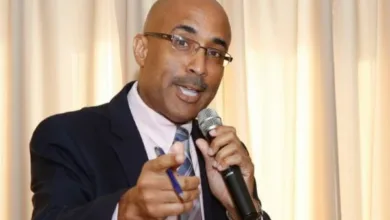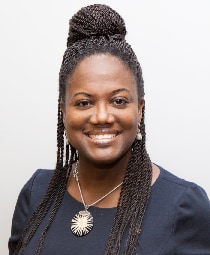Bahamian, Captain Allens takes over as Chair of Caribbean Port Delegation
NASSAU, The Bahamas – Port Controller Captain Anthony Allens took over the reins as Chairman of the Caribbean Delegation of the American Association of Port Authorities (AAPA) on January 1, 2007.
Captain Allens’ appointment vaults him into membership on the AAPA Executive Committee and its Board of Directors for the activity year, 2007. Voting took place in Fall of 2006 at the AAPA’s Annual Convention in New Orleans, Louisiana.
The AAPA is a trade association that represents deep draft public port authorities throughout the United States of America, Canada, Latin America and the Caribbean. The Association conducts extensive educational and training programs, is involved in research and compiles industry surveys, among other activities.
Port Controller Captain Anthony Allens was recently elected to lead the Caribbean Delegation at the American Association of Port Authorities.
Caribbean members of the association benefit from the opportunity to network with other port managers from the U.S., Canada and Latin America; opportunities to attend educational seminars with other port personnel; the opportunity to host an AAPA annual convention which brings significant economic benefits to the host city and also the opportunity for members to become Professional Port Managers through the AAPA’s Professional Port Manager (PPM) Certification Program.
The AAPA is divided into four regions — the U.S., Canada, Latin America and the Caribbean. A 30-year veteran of the Royal Bahamas Defense Force, Captain Allens called his election as Chairman of the Caribbean Delegation “significant.”
“One of the key benefits to our country as a result of my selection as Chairman is that as Chair, I will have access to even more information whereby I will be able to get more training opportunities and more exchange opportunities for our people that will ultimately benefit the work we do here and our communities even more greatly,” Captain Allens said.
“Additionally, appointment to the Executive Committee and the Board of Directors of the Association brings a tremendous amount of public relations value that we could not pay for. The Association also hosts a number of conferences and seminars and so forth and The Bahamas will be able to further benefit by having some of these brought here.
“And so I think this is a great opportunity for not only myself but The Bahamas as well,” Captain Allens added.
Captain Allens said one of the association’s main thrusts is to increase public awareness of ports and the important roles they play in the socio-economic development and sustainability of global countries.
He said that thrust is in line with some of the objectives of his office to heighten the importance the port areas play in the sustainability of the Bahamian economy.
Captain Allens said many Bahamians still do not fully comprehend the significance the Ports, in particular, and shipping in general, play to the economic viability of The Bahamas through its direct and trickle down effect” despite the best efforts of his office and the Government of The Bahamas insofar as public awareness is concerned.
He said the Port caters to three of the more than five million visitors that arrive on the country’s shores on an annual basis and accommodates more than 23 cruise ship visits per week.
“Apart from the Head Tax the Government collects from each of these passengers, there are the docking fees, the berthing fees, piloting fees, tug crew fees and line handlers charges that the country directly benefits from when the cruise ships call on our Port,” Captain Allen said.
“Additionally, you have the Taxi and Tour Cab drivers, the hair braiders, the straw vendors and the many privately-owned businesses operating both inside the port area and on Bay Street and the surrounding business that benefit tremendously from what we do here.
“It would be a safe bet to say that this Port contributes in the tens of millions of dollars to the Bahamian economy on an annual basis and that is no small feat,” Captain Allens added.
Captain Allens said The Bahamas’ location in the Atlantic places it in an enviable position.
“Location is, I think, one of the main ingredients, particularly when it comes to the containerization because we are midway between the South and North America and on the Atlantic side of the ocean which makes it very easy for transshipment to take place,” he said.
“There is a transshipment port in Panama and Jamaica has one, but the Freeport Container Port continues to set the standard and I think that is because of two things, location and the confidence they have in the country itself.
“That would also be true for cruise ship passengers because The Bahamas is a great attraction for persons wanting to go on three-to-four day cruises. It is very difficult to go from Florida all the way down to the southern and eastern Caribbean and come back up in three-to-four days and so we benefit from that because not everyone wants to take a seven-day cruise,” Captain Allens added.
Captain Allens said his appointment as Chairman of the Caribbean Delegation will allow The Bahamas to remain on the cutting edge of the best practices and latest security measures that are being employed globally.
He said no port can act as a “stand alone” and that membership in the Association allows every member port to access the best practices and procedures that are being used worldwide.
“All of the ports are connected in some way or the other and so it is best that we share ideas with regards to best practices and security to achieve some of our individual and collective goals,” Captain Allens said.
“While we may be competing for numbers and so forth, there are best practices that are observed throughout the world and if we miss the opportunity to be able to sit around the table and learn from each other, then we will undoubtedly miss the mark.
“Are there some things other ports in the Caribbean can learn from us that may boost their numbers? Perhaps, but it is my belief that sharing our best practices with them will not diminish the number of ship calls that we have here. As a matter of fact the sharing of information can increase the number of ship calls here because there are some things we can learn from them.
“The competition is going to come regardless. What we have to do is to constantly be on top of our game; always seek to improve our product and at the end of the day, we will achieve the goals we have set out for our industry. I truly believe in that,” Captain Allens added.


